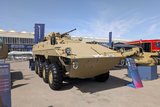BAE Systems to make engineering changes to Lot 1 ACVs
BAE Systems Land & Armaments has received a $9.57 million contract modification from US Marine Corps Systems Command in connection with the Amphibious Combat Vehicle (ACV) programme.
This brings the total cumulative face value of the ACV programme to $3.31 billion for BAE Systems, the DoD noted on 18 February.
The modification provides for integration of ACV engineering changes for air cooling in 72 Lot 1A and Lot 1B full-rate production ACV Personnel (ACV-P) variants; as well as ACV Command (ACV-C) engineering support in production, non-recurring engineering changes, production costs and fielding and support costs.
Work will be completed at five US locations in January 2023.
BAE Systems announced on 18 February that the USMC has received ACV-C for tests. Aside from this vehicle and ACV-P, there are also a recovery and maintenance vehicle (ACV-R) and a turreted version of ACV armed with a 30mm cannon (ACV-30) is under development.
As part of our promise to deliver comprehensive coverage to our Defence Insight and Premium News subscribers, our curated defence news content provides the latest industry updates, contract awards and programme milestones.
Related Programmes in Defence Insight
Related Equipment in Defence Insight
More from Land Warfare
-
![World Defense Show 2026: Turkish and European industries will cooperate, says Aselsan boss]()
World Defense Show 2026: Turkish and European industries will cooperate, says Aselsan boss
Aselsan was formed 50 years ago in response to difficulties Turkey was facing in sourcing major systems internationally. While some challenges still remain, company president Ahmet Akyol believes a rapprochement is possible.
-
![World Defense Show 2026: Russia reveals details of new loitering munition]()
World Defense Show 2026: Russia reveals details of new loitering munition
The Kalashnikov RUS-PE cannister-launched man-portable loitering munition was displayed as a model at World Defense Show 2026 with a company official telling Shephard it was “in service and in low-rate initial production”.
-
![World Defense Show 2026: MARSS displays new Nation Shield air defence C2 system]()
World Defense Show 2026: MARSS displays new Nation Shield air defence C2 system
Nation Shield is the latest iteration of the MARSS C2 system and is designed to provide C2 further forward along with more capable air defence.






















